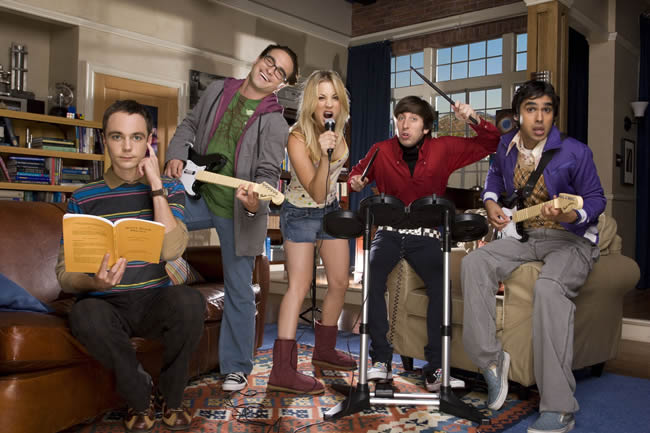Now in it’s fifth season on U.S. television, The Big Bang Theory has made serious geekiness fun and science cool. In fact, the show is rising in popularity to such an extent that a Google search for “big bang theory” ranks the show first and above all other more learned scientific entires.
Brad Hooker from Symmetry Breaking asks some deep questions of David Saltzberg, science advisor to The Big Bang Theory.
[div class=attrib]From Symmetry Breaking:[end-div]
For those who live, breathe and laugh physics, one show entangles them all: The Big Bang Theory. Now in its fifth season on CBS, the show follows a group of geeks, including a NASA engineer, an astrophysicist and two particle physicists.
Every episode has at least one particle physics joke. On faster-than-light neutrinos: “Is this observation another Swiss export full of more holes than their cheese?” On Saul Perlmutter clutching the Nobel Prize: “What’s the matter, Saul? You afraid somebody’s going to steal it, like you stole Einstein’s cosmological constant?”
To make these jokes timely and accurate, while sprinkling the sets with authentic scientific plots and posters, the show’s writers depend on one physicist, David Saltzberg. Since the first episode, Saltzberg’s dose of realism has made science chic again, and has even been credited with increasing admissions to physics programs. Symmetry writer Brad Hooker asked the LHC physicist, former Tevatron researcher and University of California, Los Angeles professor to explain how he walks the tightrope between science and sitcom.
Brad: How many of your suggestions are put into the show?
David: In general, when they ask for something, they use it. But it’s never anything that’s funny or moves the story along. It’s the part that you don’t need to understand. They explained to me in the beginning that you can watch an I Love Lucy rerun and not understand Spanish, but understand that Ricky Ricardo is angry. That’s all the level of science understanding needed for the show.
B: These references are current. Astrophysicist Saul Perlmutter of Lawrence Berkeley National Laboratory was mentioned on the show just weeks after winning the Nobel Prize for discovering the accelerating expansion of the universe.
D: Right. And you may wonder why they chose Saul Perlmutter, as opposed to the other two winners. It just comes down to that they liked the sound of his name better. Things like that matter. The writers think of the script in terms of music and the rhythm of the lines. I usually give them multiple choices because I don’t know if they want something short or long or something with odd sounds in it. They really think about that kind of thing.
B: Do the writers ever ask you to explain the science and it goes completely over their heads?
D: We respond by email so I don’t really know. But I don’t think it goes over their heads because you can Wikipedia anything.
One thing was a little difficult for me: they asked for a spoof of the Born-Oppenheimer approximation, which is harder than it sounds. But for the most part it’s just a matter of narrowing it down to a few choices. There are so many ways to go through it and I deliberately chose things that are current.
First of all, these guys live in our universe—they’re talking about the things we physicists are talking about. And also, there isn’t a whole lot of science journalism out there. It’s been cut back a lot. In getting the words out there, whether it’s “dark matter” or “topological insulators,” hopefully some fraction of the audience will Google it.
B: Are you working with any other science advisors? I know one character is a neurobiologist.
D: Luckily the actress who portrays her, Mayim Bialik, is also a neuroscientist. She has a PhD in neuroscience from UCLA. So that worked out really well because I don’t know all of physics, let alone all of science. What I’m able to do with the physics is say, “Well, we don’t really talk like that even though it’s technically correct.” And I can’t do that for biology, but she can.
[div class=attrib]Read the entire article after the jump.[end-div]
[div class=attrib]Image courtesy of The Big Bang Theory, Warner Bros.[end-div]

